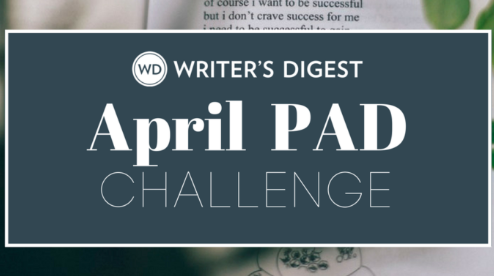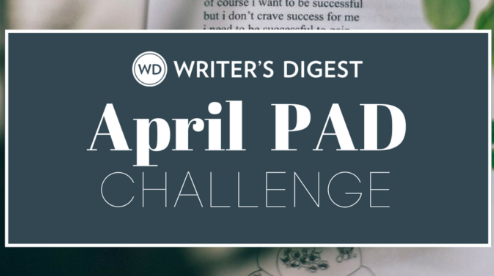Writing Mistakes Writers Make: Refraining to Revise Writing
The Writer’s Digest team has witnessed many writing mistakes over the years, so we started this series to help identify them for other writers (along with correction strategies). This week’s writing mistake is refraining to revise writing.
Everyone makes mistakes—even writers—but that's okay because each mistake is a great learning opportunity. The Writer's Digest team has witnessed many mistakes over the years, so we started this series to help identify them early in the process. Note: The mistakes in this series aren't focused on grammar rules, though we offer help in that area as well.
Rather, we're looking at bigger picture mistakes and mishaps, including the error of using too much exposition, neglecting research, or researching too much. This week's writing mistake writers make is refraining to revise writing.
Writing Mistakes Writers Make: Refraining to Revise Writing
When you're reading an incredible piece of writing for the first time, it's easy to fall into a certain trap and believe that what you're reading was the first draft. In most cases, whether you're reading a novel, article, or blog post, you're probably reading a revised draft. And for books in particular, you're probably reading a draft that's received feedback from several people in the revision process. As an editor, I know how this works.
But there was a time when I refrained from revising, and I had some good reasons (or so I thought):
- My first draft captured all my initial feelings and emotions.
- Revision would only dull those "bright burning" emotions and lead to stale and stilted language.
- I had no idea how to go about effectively revising my writing.
I've heard all these reasons given by other writers. But if I'm being honest with myself, the third reason was the real one for why I refrained from revising early on. In my mind, I felt like revision meant destroying my first draft. It also felt like the creative process was over, and the creative process is the part I loved (and still do).
So here's the mind shift I had to make: Revision is not the end of the creative process; rather, it's an extension of it.
Mistake Fix: Recreate Your Writing
What helped me get into revision is to think of the first draft as the "creation" phase of my writing and the second (and all other) draft(s) as the "recreation" phase of my writing. This might involve expansion of the original text or making it as concise as possible.
Here are a few tricks for recreating your writing whether you're writing poems, stories, or nonfiction:
- Give yourself some space from your writing. The hardest thing to do in the revision process is jump right into the first draft as soon as you've finished it. You still have the writer's high of completing the first draft, which is a good thing, but it usually clouds a writer's judgment when holding the red pen. Give yourself at least 24 hours, but a week would be better. The more distance you give yourself the more likely you'll come into the manuscript with an objective eye.
- Look for ways to expand. Often, I only scratch the surface of a topic in my first draft. Are there ways to dig deeper? Are there threads that could be pulled? Characters who could be developed? Conversations expanded? Metaphors explored?
- Look for ways to cut. Especially when it comes to language, I often find there is plenty of room for concision. Cutting out the word "that" usually does not impact meaning, but it does tighten up writing. Also, consider cutting unnecessary adjectives and adverbs. Related to that...
- Make your writing active. Take these passive sentences, "He had written a story about the murder. The story was read by the gardener. The gardener was a witness to something strange around the time of the crime," and make them more active: "He wrote a story about the murder. The gardener read the story and let the journalist know he saw something strange around the time of the crime."
- Take stylistic risks. There are so many rules of proper writing, and they're good guidelines because breaking them usually leads to bad results. However, breaking the rules (if you know you're doing it and why) can often lead to a more enjoyable experience for writer and reader alike—because it's not expected. So keep in mind that constant rule breaking can wear on your readers, but a risk here and there can be the thing that makes your story memorable.
However you decide to recreate your writing, be sure to keep copies of earlier drafts. This will allow you to recreate without worrying about losing an earlier version that you may have liked. And it will enable you to see how your recreation process has evolved over time.
If you're completely new to the revision process and still feel overwhelmed by it, that's okay. I've been there and completely understand. In such a case, save your current draft and reach out to an editor and give them free reign to mark up your draft, move language around, and give you directions to take your writing.
Receiving such feedback can sometimes feel like an attack on your writing skills, but remember: Nearly every great piece of writing you've ever read has gone through the revision process—sometimes through more than a dozen drafts. Honestly, you want to find new places to take your writing; it's part of the creation process (the re-creation process).
*****
2nd Draft provides a high-level review of your writing, pointing out reasons your work may be getting rejected, or may not meet the standards of traditional publication. After an evaluation of your submission, one of the professional 2nd Draft critiquers will provide feedback and advice. You’ll not only learn what’s working in your writing, but what’s not, and—most important—how to fix it..
Robert Lee Brewer is Senior Editor of Writer's Digest, which includes managing the content on WritersDigest.com and programming virtual conferences. He's the author of 40 Plot Twist Prompts for Writers: Writing Ideas for Bending Stories in New Directions, The Complete Guide of Poetic Forms: 100+ Poetic Form Definitions and Examples for Poets, Poem-a-Day: 365 Poetry Writing Prompts for a Year of Poeming, and more. Also, he's the editor of Writer's Market, Poet's Market, and Guide to Literary Agents. Follow him on Twitter @robertleebrewer.







